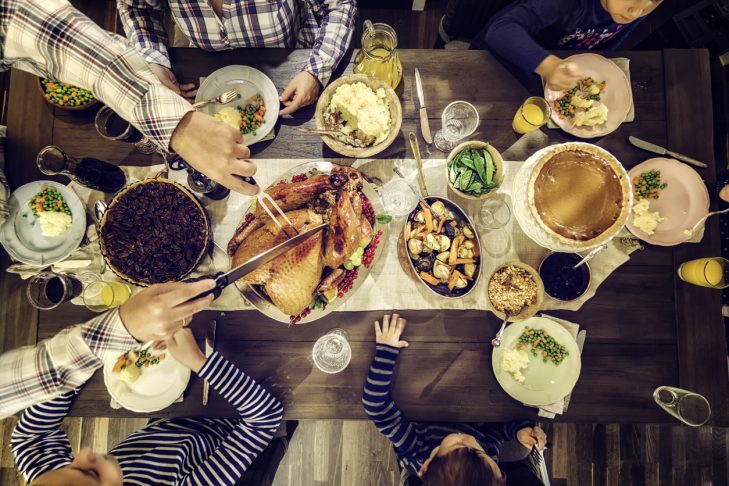Thanksgiving seems to be the most popular American holiday for Jews. The most obvious reason? It’s the great equalizer—we are all invited to the party! Ironically, it has come to be regarded as the kickoff to the “holiday season,” which, of course, refers to the all-pervasive Christmas, with a touch of Hanukkah on the side.
Now, of course, there are many Jewish people who are not the least bit bothered by the Christmas season and don’t feel at all excluded. I just don’t happen to be among them. For me, Christmas makes me feel like “the other.” Despite guarantees of religious freedom, the reality is that, culturally, the United States is a majority Christian country, and during the Christmas season, I feel like I’m “not invited to the party,” even though I’m generally invited to and attend seasonal parties. But a part of me always sees myself from the outside looking in: I don’t have a tree, I don’t buy poinsettias or a wreath and I quickly tire of Christmas music on elevators. Bah, humbug!
But back to the joys of Thanksgiving for American Jews. Though the holiday has a touch of religious content, it is of the universal variety and has generally come to be regarded as a secular observance. For observant Jews in particular, it is a day where there are no travel restrictions or rules about turning lights or ovens on or off. Turkey, albeit of the kosher variety, can be enjoyed just as it is with their non-Jewish neighbors. (Contrast this to Christmas parties, where ham is de rigueur and undesirable, even to most of the non-observant.)
The traditional Thanksgiving meal is likewise an attractive feature that resonates with Jews since Jewish people love to eat and are very comfortable with the concept of tradition, family, storytelling and giving thanks. Eating the same basic holiday foods every year resembles the food-based customs of Passover, Hanukkah, Rosh Hashanah and even Shavuot. The story of the first sit-down between the pilgrim settlers and Native Americans is easily relatable to Jewish people and reflects the value of welcoming the stranger. (Some even theorize that this festive harvest holiday was based originally on Sukkot.) Of course, this view of history has been challenged as of late by a very different narrative experienced by Native Americans. Nonetheless, the values of hospitality and expressions of gratitude embedded in the original story still ring true.
Thanksgiving reminds us, as Americans, that we are all a nation of immigrants—our pilgrim forbearers arrived at our Massachusetts shore seeking religious freedom. Most Jewish people can relate to their own family histories, which involve stories of immigration from a not-so-distant past.
The United States is, after all, a grand experiment in diversity, from which Jews have benefitted more than in any other society in history. It is clearly within the interest of the Jewish community to guard these values of inclusivity and mutual respect and push back against the wave of exclusion and intolerance of “the other” that we have sadly seen rearing its ugly head.
When I was a child, my dear uncle ended our Thanksgiving meal by leading the whole family in the singing of “God Bless America.” Jews love Thanksgiving because it is the holiday that marries American and Jewish values by emphasizing what unites us all. On Thanksgiving, a national holiday created by President Abraham Lincoln in the midst of the most divisive civil war, Americans of all stripes take time out to express gratitude for our good fortune to share in America’s bounty and to recommit to fulfilling America’s promise of equality of opportunity for all. What could be more Jewish than aspiring toward tikkun olam for our beloved country?
Happy belated Thanksgiving!
This post has been contributed by a third party. The opinions, facts and any media content are presented solely by the author, and JewishBoston assumes no responsibility for them. Want to add your voice to the conversation? Publish your own post here. MORE



